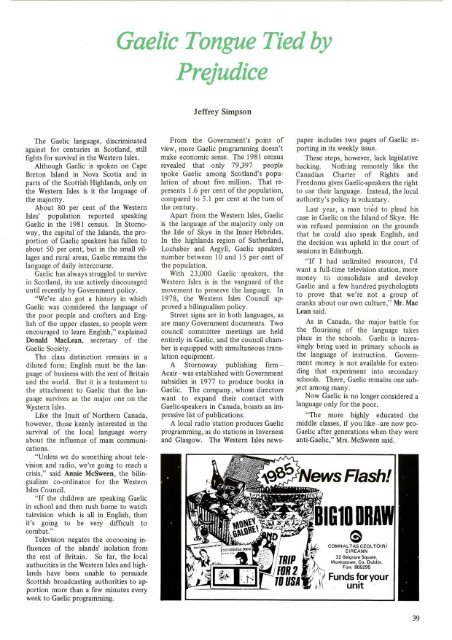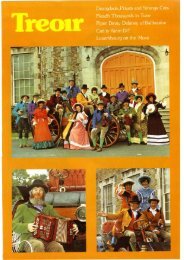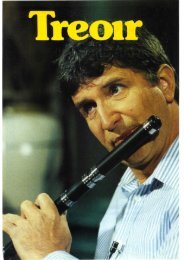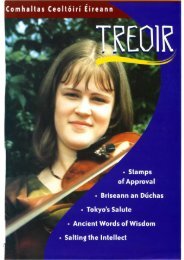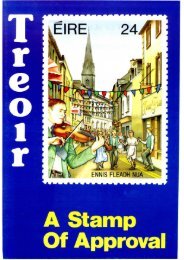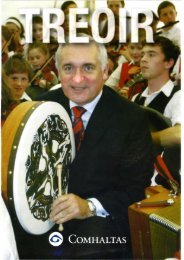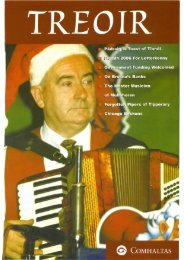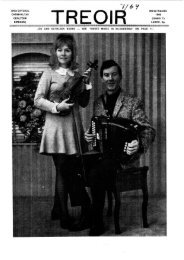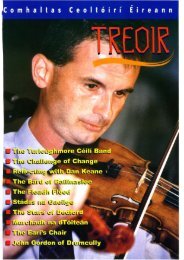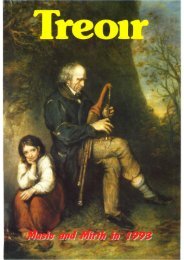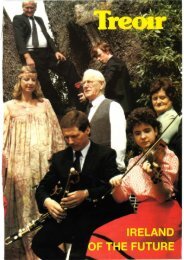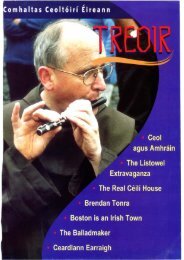Comhaltas Archive
Comhaltas Archive
Comhaltas Archive
- No tags were found...
You also want an ePaper? Increase the reach of your titles
YUMPU automatically turns print PDFs into web optimized ePapers that Google loves.
Gaelic Tongue Tied byPrejudiceJ effrey SimpsonThe Gaelic language, discriminatedagainst for centuries in Scotland, stillfights for survival in the Western Isles.Although Gaelic is spoken on CapeBreton Island in Nova Scotia and inparts of the Scottish Highlands, only onthe Western Isles is it the language ofthe majority.About 80 per cent of the WesternIsles' population reported speakingGaelic in the 1981 census. In Stornoway,the capital of the Islands, the proportionof Gaelic speakers has fallen toabout 50 per cent, but in the small villagesand rural areas, Gaelic remains thelanguage of daily intercourse.Gaelic has always struggled to survivein Scotland, its use actively discourageduntil recently by Government policy."We've also got a history in whichGaelic was considered the language ofthe poor people and crofters and Englishof the upper classes, so people wereencouraged to learn English," explainedDonald MacLean, secretary of theGaelic Society.The class distinction remains in adiluted form; English must be the languageof business with the rest of Britainand the world. But it is a testament tothe attachment to Gaelic that the languagesurvives as the major one on theW,estern Isles.Like the Inuit of Northern Canada,however, those keenly interested in thesurvival of the local language worryabout the influence of mass communications."Unless we do something about televisionand radio, we're going to reach acrisis," said Annie McSween, the bilingualismco-ordinator for the WesternIsles Council."If the children are speaking Gaelicin school and then rush home to watchtalevision which is all in English, thenit's going to be very difficult tocombat."Television negates the cocooning influencesof the islands' isolation fromthe rest of Britain. So far, the localauthorities in the Western Isles and highlandshave been unable to persuadeScottish broadcasting authorities to apportionmore than a few minutes everyweek to Gaelic programming.From the Government's point ofview, more Gaelic programming doesn'tmake economic sense . The 1981 censusrevealed that only 79,397 peoplespoke Gaelic among Scotland's populationof about five million. That represents1.6 per cent of the population,compared to 5.1 per cent at the turn ofthe century.Apart from the Western Isles, Gaelicis the language of the majority only onthe Isle of Skye in the Inner Hebrides.In the highlands region of Sutherland,Lochaber and Argyll, Gaelic speakersnumber between 10 and 15 per cent ofthe population.With 23,000 Gaelic speakers, theWestern Isles is in the vanguard of themovement to preserve the language. In1978, the Western Isles Council approveda bilingualism policy.Street signs are in both languages, asare many Government documents. Twocouncil committee meetings are heldentirely in Gaelic, and the council chamberis equipped with simultaneous translationequipment.A Stornoway publishing firmAcair- was established with Governmentsubsidies in 1977 to produce books inGaelic. The company, whose directorswant to expand their contact withGaelic-speakers in Canada, boasts an impressivelist of publications.A local radio station produces Gaelicprogramming, as do stations in Invernessand Glasgow. The Western Isles newspaperincludes two pages of Gaelic reportingin its weekly issue.These steps, however, lack legislativebacking. Nothing remotely like theCanadian Charter of Rights andFreedoms gives Gaelic-speakers the rightto use their language. Instead, the localauthority's policy is voluntary.Last year, a man tried to plead hiscase in Gaelic on the Island of Skye. Hewas refused permission on the groundsthat he could also speak English, andthe decision was upheld in the court ofsessions in Edinburgh."If I had unlimited resources, I'dwant a full-time television station, moremoney to consolidate and developGaelic and a few hundred psychologiststo prove that we're not a group ofcranks about our own culture," Mr. MacLean said.As in Canada, the major battle forthe flourising of the language takesplace in the schools. Gaelic is increasinglybeing used in primary schools asthe language of instruction. Governmentmoney is not available for extendingthat experiment into secondaryschools. There, Gaelic remains one subjectamong many.Now Gaelic is no longer considered alanguage only for the poor."The more highly educated- themiddle classes, if you like- are now proGaelic after generations when they wereanti-Gaelic," Mrs. McSween said.V~IJIII"" Flash!IGlOOaCOMHALTAS CEOLTOIRiEIREANN32 Belgrave Square.Monk'town, Co . Du blin.Fa n: 800295Funds for yourunit39


